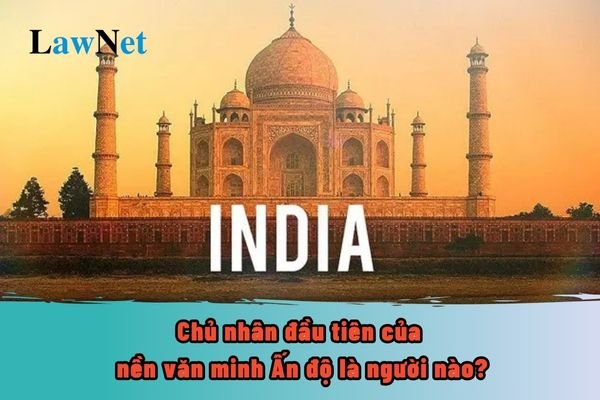Who were the first progenitors of Indian civilization? When do students in Vietnam study the Indian civilization?
Who were the first progenitors of Indian civilization?
The Dravidian people were indeed the first progenitors of Indian civilization, laying the initial foundations for the development of one of the most splendid ancient civilizations in the world.
Let's explore who the first progenitors of Indian civilization in the information below:
The Dravidian people are considered the first progenitors of Indian civilization.
Detailed explanation:
Indus Valley Civilization: The first ancient civilization of India developed along the Indus River Basin. Numerous remains of this civilization have been discovered, including ancient cities, drainage systems, and massive architectural works... The people who established this civilization were the Dravidians.
Dravidian people: They are an indigenous ethnic group that has been living in South Asia for a very long time. The culture of the Dravidian people has left many marks on today's Indian culture, especially in terms of language and religion.
*Note:
Aryan people: Later, the Aryans migrated from Central Asia to India and had a significant influence on Indian culture and society. However, the Aryans were not the ones who originated the first Indian civilization.
Cultural amalgamation: Throughout historical processes, the culture of the Dravidians and the Aryans blended, creating a diverse and rich Indian culture as seen today.
*Note: The information is for reference only./.

Who were the first progenitors of Indian civilization? When do students in Vietnam study the Indian civilization? (Image from the Internet)
When do students in Vietnam study the Indian civilization?
According to Section 3 of the General Education Program for the subject of History (upper secondary level) issued together with Circular 32/2018/TT-BGDDT on the objectives of the History subject for grade 10 at the upper secondary level:
Some Eastern Civilizations
Egyptian Civilization
- Formation base
- Key achievements
Chinese Civilization
- Formation base
- Key achievements
Indian Civilization
- Formation base
- Key achievements
- Know how to collect and use historical materials to learn about ancient Eastern civilizations.
- Explain the formation basis of ancient Egyptian civilization: natural conditions, population, economic, political - social development,...
- State the significance of the main achievements of Egyptian civilization: writing, natural sciences, architecture, sculpture,...
- Analyze the formation basis of Chinese civilization: natural conditions, population, economic, political - social development,...
- State the significance of the key achievements of Chinese civilization: writing, literature and arts, historiography, natural sciences, medicine, astronomy, calendar, thoughts, religions,...
- Analyze the formation basis of Indian civilization: natural conditions, population, economic, political - social development,...
- State the significance of the fundamental achievements of Indian civilization: writing, literature and arts, natural sciences, thoughts, religions,...
Thus, the exploration of Indian civilization will be included in the History subject curriculum for grade 10.
What is the mission of the History subject at the upper secondary level in Vietnam?
According to Section 1 of the General Education Program for the subject of History (upper secondary level) issued together with Circular 32/2018/TT-BGDDT on the characteristics of the History subject at the upper secondary level:
- History is a subject belonging to the Social Sciences group, chosen according to career orientation at the upper secondary level.
- The History subject has the mission to help students form and develop historical competence, a component of scientific competence, while also contributing to the formation and development of key qualities and general competencies identified in the overall program.
- History plays a leading role in educating patriotism, national pride, historical and cultural traditions, helping students recognize and apply historical lessons to address real-life problems, develop a vision, and consolidate humanistic values, community spirit, tolerance, and humanity; contributing to forming and developing the qualities of Vietnamese citizens, global citizens in the development trend of the era.
- The History subject forms and develops in students historical thinking, systematic thinking, critical thinking, skills to exploit and use historical sources, recognize and present history in chronological and synchronous logic, connecting the past with the present.
- The History subject helps students understand the scientific value and practical value of historiography in the modern social life, to love and understand the history, culture of the nation and humanity; contributes to orienting students in choosing careers such as research in social sciences and humanities, diplomacy, management, tourism activities, cultural industries, information, and communication,...
- The History subject program systematically consolidates general history knowledge at the basic education stage, while also helping students explore deeper into core historical knowledge through themes, study topics about world history, Southeast Asian history, and Vietnamese history. The method of teaching History is carried out on the foundation of basic principles of historiography and modern educational methods.
Thus, the mission of the History subject at the upper secondary level is to help students form and develop historical competence, a component of scientific competence, while also contributing to forming and developing the significant qualities and general competencies identified in the overall program.

